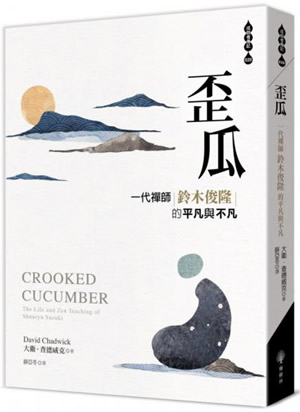Back to Crooked Cucumber - Supplemental
 A Chinese translation has been published in 2023. Translated by Ada Xue Yadong. It's available from many online stores in Taiwan.
A Chinese translation has been published in 2023. Translated by Ada Xue Yadong. It's available from many online stores in Taiwan.
From Ada Xue's emails to DC:
Hope you’ll receive this email. It’s Ada from New Zealand. I’m not sure if you still remember me, because it’s many years ago that I tried to translate Crooked Cucumber into Chinese and contacted you through email at that time. However, after I finished translation ( I think it’s 2015 or 2016 ), the situation in China changed drastically and it’s impossible to publish a book like this. I was so frustrated.
I didn’t expect that good opportunity would finally come this year. Eventually I found a publisher in Taiwan and they liked your book so much. Things went so smoothly and please see the attached photo of the book in Chinese. I couldn’t describe how excited I was when I received the sample from the publisher!
And I would like to tell you that this book, or Suzuki Roshi, deeply influenced my life. I was not a Buddhist when I translated the book, only a person with aspirations to seek the meaning of life. After all these years, I’m now a sincere Buddhist practitioner. I want to say thank you. You don’t know how much I got inspired by your wonderful book. It’s like Suzuki Roshi himself put the seed into my heart. A lot of my friends, by reading the book ( I sent them my translation file), also grow up with me into Buddhist practitioners.
By the way, I’m now studying with Dzongsar Khyentse Rinpoche’s sangha and practicing Ngondra. My instructor is Jacob Leschly. I don’t know if you know him but I saw you online when he held a dharma talk meeting with Samuel Bercholz on Zoom last year. I was so glad to see your face that time, but I was too shy to contact you afterwards — anyway the book at that time seemed had no chance to be published in Chinese.
I just want to say thank you and wish you happy New Year! May all be auspicious and
Sincerely yours
Ada Xue
P.S. I like both covers of the two versions 🤭
Introduction to the Chinese Translation of Crooked Cucumber (March 17, 2012)
Greetings to you who will read this book in Chinese. It is an honor to know that it will be translated into your language, the native tongue of Zen. I think that Shunryu Suzuki would also be pleased about this thread of Buddhism stitching back to its homeland. As a youth he studied not only Chinese Zen scriptures but the history, classics, poetry, and astrology of China. Like many other prominent Zen teachers, Suzuki felt it essential to return to the hearty roots of Zen as found in the teachings of Bodhidharma and the early Chinese ancestors. I was fortunate to have studied with Suzuki some of the Chinese and Japanese texts on which he was lecturing. I recall that before his health started failing, he was planning to tackle next the Sixth Patriarch’s Platform Sutra, a work he considered unparalleled.
Shunryu Suzuki was a man who treasured peace and understanding between all people and was distressed by Japan’s imperialistic militarism that caused so much suffering and death. His brief journey to Manchuria in 1944 seems to have been a futile attempt to add a ray of light in the nightmare of that time.
Maybe he felt like a misfit in his native land or maybe he had a wanderlust, for from an early age Suzuki’s inner compass pointed to a foreign land. Eventually this calling led him to San Francisco where he lived and taught for twelve years. In that time he founded the San Francisco Zen Center and a pioneering Buddhist monastery in the West with men, women, and married couples practicing together. Both are flourishing to this day as are many other centers and groups in the West which were started by teachers and students in his lineage.
Suzuki’s influence has reached far beyond the confines of Buddhism. Artists, musicians, poets such as Allen Ginsberg, schoolteachers, businesspeople, scientists, and students, people of all faiths and no faith, pacifists and veterans came to meditate with him. After he’d died his fame increased. Venture capitalist and philanthropist Laurance Rockefeller, major film director Sam Peckinpah, legendary basketball coach Phil Jackson, and Apple founder Steve Jobs read and reread Suzuki’s lectures as found in books such as Zen Mind, Beginner’s Mind.
Suzuki was a naturally humble person who said he learned from his students as well as they from him. He loved Japan and Japanese culture, but he was in no way ethnocentric. His heart was with all beings, all people, no particular nation or race. He wistfully longed to be able to go to Southeast Asia and China some day to meet and learn from teachers there. He thought that cross fertilization between East and West would strengthen and deepen the wisdom and mutual understanding of the people on both sides. I can almost hear him cautioning the reader that he is not your master but your spiritual friend who is merely pointing to the great way in your own traditions and your own heart.
I hope you enjoy reading about this man of no rank.
I also hope some day to meet and bow to each of you.
May all beings be happy and live in peace and prosperity,
David Chadwick
cuke.com, shunryusuzuki.com, zmbm.net